Biden And Netanyahu Break The Ice, With Invitation To Washington
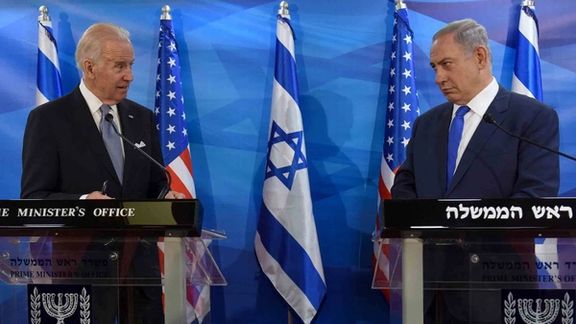
US President Joe Biden has invited Israeli Prime Minister Benjamin Netanyhau to Washington for an official visit, the White House and the prime minister's office said Monday.

US President Joe Biden has invited Israeli Prime Minister Benjamin Netanyhau to Washington for an official visit, the White House and the prime minister's office said Monday.
The move announced after a phone conversation between the two leaders marks a shift in US - Israeli relations as most Israeli prime ministers had already received an invitation to the White House this far into their terms.
The two leaders shared a "long and warm" conversation, the Israeli statement said, focused on curbing threats from Iran and its proxies and strengthening the alliance between the two countries.
US National Security Council spokesman John Kirby said, “The two consulted on our close coordination to counter Iran, including through regular and ongoing joint military exercises. They noted that U.S. that the US-Israel partnership remains a cornerstone in preventing Iran from ever acquiring a nuclear weapon."
Netanyahu told the US President he would try to form "broad public consensus" on controversial legislation in Israel that would see its highest court stripped of much of its powers.
President Biden and his administration have voiced concern over Netanyahu’s government plans to overhaul the judicial system taking away some of the powers of unelected judges. This has led to a serious split among the public, with months of large protests by those opposing the plan.
Kirby said, "We believe strongly in the democratic institutions and the ideals of democracy that the United States and Israel represent, not just in their particular parts of the world, but across the world. And we want to see Israel be as vibrant and as viable democracy as possible.”

The United States has officially confirmed earlier reports of sending more warplanes and additional warships to the Persian Gulf region to deter Iranian moves.
The Pentagon said Monday that it will send additional F-35 and F-16 fighter jets, along with a warship to the Middle East, in a bid to monitor key waterways in the region following Iran's seizure and harassment of commercial shipping vessels in recent months.
Meanwhile, in a telephone conversation on Monday US President Joe Biden and Israeli Prime Minister Benjamin Netanyahu discussed security challenges Iran poses in the region.
“The two consulted on our close coordination to counter Iran, including through regular and ongoing joint military exercises. They noted that U.S. that the US-Israel partnership remains a cornerstone in preventing Iran from ever acquiring a nuclear weapon," White House strategic coordinator John Kirby said.
In May, the White House had announced that the Biden administration would be making a series of moves in the region, but at the time did not say what it would include.
"The (Pentagon) is increasing our presence and ability to monitor the (Strait of Hormuz) and surrounding waters," Pentagon spokeswoman Sabrina Singh told reporters. It was not clear where exactly the additional jets would be placed and how long they would stay in the region.
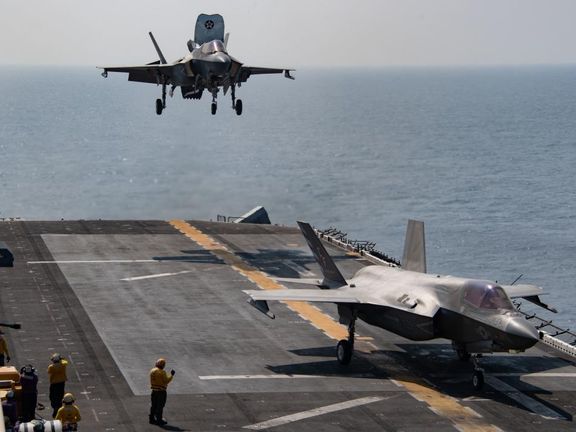
A Pentagon official had said earlier that F-16 fighters will be placed in the region, but Monday’s announcement included more weapons systems.
Iran’s latest attempts to interfere with commercial shipping occurred earlier this month when it tried to seize two vessels. The US Navy announced July 5 that it prevented Iranian naval forces from diverting the vessels including the Richmond Voyager, a super tanker managed by Chevron in the Strait of Hormuz, the narrowest part of the Persian Gulf.
Since 2019, there have been a series of attacks on shipping in strategic Persian Gulf waters at times of tension between the United States and Iran. The Revolutionary Guard has seized or attacked 15 vessels since 2019, according to US NAVY. Over the years, Iranian speedboats also harassed US Navy ships, sometimes in dangerous maneuvers.
About a fifth of the world's crude oil and oil products passes through the Strait of Hormuz, a choke point between Iran and Oman.
With the 2015 Iran nuclear deal effectively dead, Iran's relations with the West have deteriorated over the last year, with Iran supplying hundreds of kamikaze drones to Russia that have been regularly used to attack civilian and infrastructure targets in Ukraine. The US and its allies have warned Tehran to seize its military cooperation with Moscow that can expand into supplying ballistic missile later this year when a UN restriction on Iran expires.
Due to former US President Donald Trump's withdrawal from the 2015 nuclear deal and President Joe Biden not being able to revive it, Iran has been accumulating more enriched uranium and could make the fissile material for one bomb in 12 days or so, according to US estimates, down from a year when the accord was in force.
Iran denies seeking nuclear weapons, which the West sees as a threat to Israel and Persian Gulf Arab oil exporters. But its enrichment of uranium to 60-percent purity has no civilian purpose and can only be for further enrichment to above 90-percent needed for building nuclear weapons.
Iran also probably wants to use escalatory tactics to force Washington to accept its terms in recently reported diplomatic contacts between the two sides aimed at some sort of a deal over Americans held hostage by Tehran.
Iran wants Washington to agree to around $20 billion of its frozen funds in third countries to be released, which would be significant for its beleaguered economy. Iraq holds around $10 billion of debts to Iran, while South Korean banks hold another $7 billion.
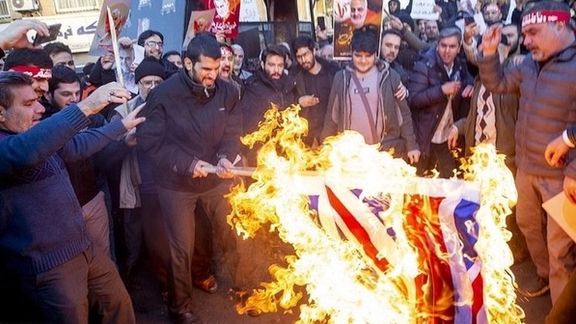
A group of UK politicians have written to Foreign Secretary James Cleverly calling on the government to adopt more stringent measures against Iran.
“Iran is the Middle East’s largest, most aggressive power, with an obvious commitment to revising the global order, with a growing alliance with Russia and a desire to deepen it," read the letter by a group of prominent British figures, including two former defense ministers, a former leader of the Liberal Democrat party, and the current chair of the parliamentary committee on foreign affairs.
The signatories included Menzies Campbell, former leader of the Liberal Democrats, Michael Fallon, former defense secretary, Alicia Kearns, chairwoman of the Commons Foreign Affairs Select Committee, General David Richards, former chief of defense staff, George Robertson, former NATO secretary general, and Mark Sedwill, former national security adviser and former cabinet secretary.
The letter highlighted Iran’s increasing audacity in its pursuit of international disruption and condemns its human rights record, nuclear program acceleration, support for proxies in the Middle East, assistance to Russia in the Ukraine conflict, and sponsorship of terrorism and kidnapping, stating that these actions contribute to Iran’s status as a clear threat to international stability and necessitate a robust response from the UK and its allies.
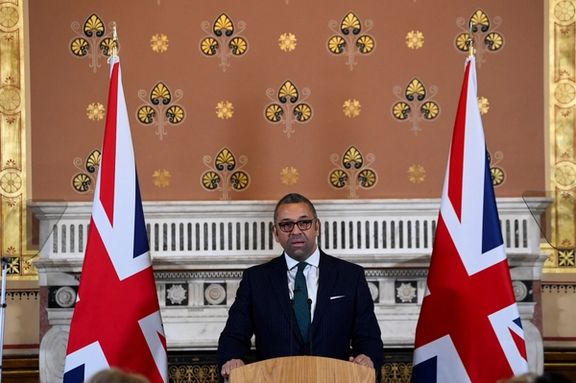
In the letter, they backed the analysis and recommendations of a report from the British conservative think tank Policy Exchange, which argues that treating Iran’s nuclear ambitions in isolation from broader security concerns is a failure of Western policy, urging a comprehensive approach to deal with the regime.
"The most obvious failure of western policy, and particularly British and European policy, has been to compartmentalize the nuclear issue diplomatically and then treat this as the central policy issue in relations with Iran,” read the report.
Stressing the need to view the nuclear program within the context of Iran’s wider aspirations and aggressive behavior, the think tank said, "Nuclear developments, while an important part of the package, must be situated within a more comprehensive understanding of the wider threat posed by Iran. Iran policy, meanwhile, must begin with the strategic threat that Iran poses, not the single, symptomatic element that is its nuclear program.”
The report also claimed that in the 2010s, the Islamic Republic shifted from a defensive strategic posture to an expansionist one, warning that “Iranian expansion across the Middle East will continue unless there is a Western – and indeed a regional Arab – policy change.”
Referring to the regime’s links to proxies in Iraq, Syria, Lebanon, and Yemen, as well as relationships with Palestinian Islamic Jihad (PIJ) and Hamas, the report argued: “The longer Iranian regional expansion is left unchecked, the more Iran will cement its hegemony over significant parts of the Levant, Iraq and the southern Arabian Peninsula, intensify its efforts to undermine and eventually destroy Israel and expand its presence beyond the Middle East.”
Moreover, the report argues that the UK government should be doing more to counter both overt and covert regime’s operations within Britain, to "prevent assassinations and kidnappings in the UK, including by tasking the Joint Terrorism Analysis Center and National Crime Agency’s intelligence capabilities, along with MI5 and MI6 to hire more Persian analysts and better fuse MI5, MI6, and NCA capabilities".
Rooting for tougher sanctions on Iran and a crackdown on its illicit finances as well as disrupting the regime’s relations with Russia, the report called for the UK government to trigger the snapback process of the Joint Comprehensive Plan of Action (JCPOA), also known as the 2015 Iran nuclear deal, to isolate the regime and gain international support for an anti-Iranian coalition.
“Iran will soon expand its support to Russia’s war in Ukraine. Having already transferred drones to Russia, Iran is likely soon to begin transfers of advanced ballistic missiles to the Kremlin,” the report underlined, forewarning of the sanctions on Iran’s ballistic missile exports that will lapse in October under the JCPOA, if the snapback is not applied.
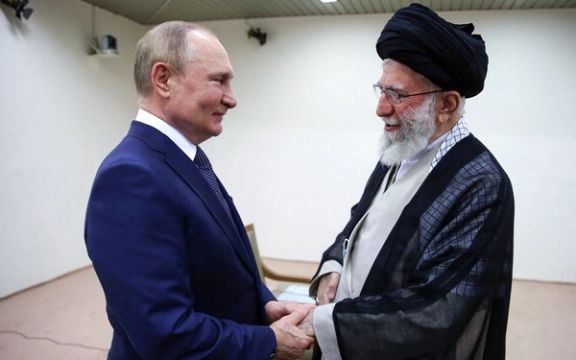
The think tank argued that triggering the snapback mechanism forces the issue of Iran among the signatories of the JCPOA and send a clear message about the international community’s stance on the regime’s nuclear program
Strengthening security and intelligence partnerships with key powers surrounding Iran, including Azerbaijan, Saudi Arabia, the UAE, Jordan, and Israel, was also suggested as a means to enhance the UK’s position in dealing with the Islamic Republic.
According to a report by The Times, UK diplomats are in talks with western allies -- France, Germany and the United States -- about reimposing sanctions on Iran amid warnings that the country is a threat to British interests “at home and abroad”.
This year, British police and the security services said they had foiled 15 plots by Iran to either kidnap or kill British or UK-based individuals it considers “enemies of the regime”.

The US Deputy Special Envoy for Iran expressed concern that the morality police are again cracking down to enforce mandatory hijab.
"It seems the regime has learned nothing from the protests. Women and girls everywhere should be allowed to wear whatever they want," tweeted Abram Paley on Monday.
The office of the US Special Envoy for Iran showed its first signs of life following days of media storm about circumstances surrounding the former envoy’s dismissal on Friday.
The official twitter account of the mission said: “The Office of the Special Envoy for Iran and the entire team at the State Department remain engaged in implementing our policy on Iran.” The account had been inactive since early June, about a month before Rob Malley’s suspension was announced.
The ‘morality’ police in Iran have returned to the streets of Tehran and other cities ahead of the first anniversary of Mahsa Amini's death in police custody last September, which triggered mass unrest in its wake.
A video which went viral on Saturday showed Tehran's morality police arresting a teenage girl without compulsory hijab in the Gisha neighborhood.

Some US lawmakers and others are frustrated about the Biden administration’s silence on the case of its Iran envoy as Tehran's media disclose more information.
National Security Adviser Jake Sullivan, who appeared on CBC News’ "Face the Nation" on Sunday, refused to offer any transparency regarding the FBI investigation of Robert Malley’s mishandling of classified information and his dismissal as the US special envoy for Iran.
“I can't speak to the current circumstances," he said. Instead, he expressed admiration for Malley, saying, " Rob Malley has served multiple administrations faithfully and well. He is a public servant. He is a diplomat. He is engaged in high level, high stakes diplomacy for a long time. And he's someone who a lot of us, including myself, have deep respect for."
He noted that the US has had “indirect contact” with Iran to try to get a deal that could get the American citizens imprisoned in Iran released, adding that “With respect to the nuclear program, we're not close to any kind of a deal.”
Rep. Michael McCaul (R-TX), the chair of the House Foreign Affairs Committee who issued Thursday an ultimatum to the State Department to come clean about the suspension of Malley, also appeared on the show with a tone very different from that of Sullivan.
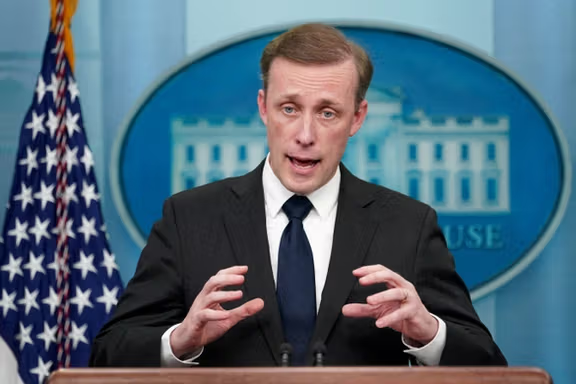
“We sent a letter. We were rebuked. We have been given no answer about his status,” he said, emphasizing that “this is a top negotiator to Iran” with access to “highest classified secrets.”
"We are giving a deadline of July 25th to have the diplomatic security and management secretary come in and brief us in a classified space,” he said, warning of a “worst case scenario” in which Malley “transferred intelligence and secrets to our foreign adversaries.” “There's no proof of that, but if he did, that would be treason in my view.”
McCaul wrote twice in the past two weeks to Secretary of State Antony Blinken demanding information. The Senior Republican lawmaker was rebuffed the first time.
McCaul asserted that now “the Committee expects prompt and full compliance with its requests, and it will not tolerate obstruction of its oversight of this national security matter.”
Capitol Hill Republicans are growing increasingly frustrated with the Biden administration’s unwillingness to share information about the issue. Adding insult to injury, the Iranian regime’s media is trickling details surrounding the case and infuriating US lawmakers, who believe the Islamic Republic knows more about the issue than they.
In its second article published on Sunday, Tehran Times, a publication controlled by the Iranian regime, provided more astonishing details about Malley's situation.
Tehran Times quoted an unnamed source at the US State Department as telling them that “the main problem of Malley stems from his secret talks with Iranian Ambassador to the UN Saeed Iravani and his meetings with some Iranian American figures in the US.”
According to the article, these people include Ali Vaez, Malley’s former right-hand man at the Crisis Group; Vali Nasr, a professor at Johns Hopkins School of Advanced International Studies; and Trita Parsi, the current employer of Malley’s son at the Quincy Institute, and the founder and former president of the National Iranian American Council (NIAC), which is recognized by Iranians living in the United States as the lobby of the Islamic Republic. “They are Iranian Americans whose presence in Democrats’ Iran diplomacy during the Obama and Biden administrations is quite clear.”
“Thanks to their connection with the former Iranian negotiators, some of whom are still present in the current negotiating team, they play the role of broker and middleman between Tehran and Washington,” Tehran Times said.
Another claim made by the article was that Malley had been in full coordination with the State Department in promoting his negotiation strategies and tactics and his dismissal was not due to a disagreement between the Secretary of State team and the National Security Advisor team, saying that “Perhaps the reason why Secretary of State Tony Blinken did not meet and talk with Malley is because the top diplomat does not want the scope of this scandal to expand and tarnish his reputation.”
On Thursday, a group of 18 Republican senators called for a probe into the murky circumstances surrounding the State Department’s handling of Malley’s security clearance investigation. Spearheaded by Senator Bill Hagerty (R-TN), the group sent a letter to Diana Shaw, the acting inspector general of the Department of State, outlining specific questions that must be answered “no later than Friday, July 21, 2023.”
Congress was kept in the dark about Malley having been suspended at least since early May and was only informed about it when his replacement was announced. Malley’s suspension was first reported by Iran International June 29, and formally announced the following day by Matthew Miller, the spokesperson for the US State Department, calling it "a leave of absence”. However, it is believed he had been suspended as early as April.

A US senator hailed legislation passed by the Senate Foreign Relations Committee to support action against Iran's killing of protesters and systematic persecution of women.
Senator Jim Risch (R-Idaho) said Friday that last year's nationwide unrest showed the depth of the people's desire to live free of the “oppressive mullahs”.
“This resolution recognizes their efforts and encourages the administration to do more to end the regime’s systemic persecution of women and state-sponsored murder of Iranian citizens, and to hold human rights violators in Iran accountable. Supporting the aspirations of the Iranian people must be a key pillar of our Iran policy.”
In January, a bipartisan resolution was introduced in the Senate reaffirming US support for Iranian citizens who took to the streets in peaceful protest and condemning Iranian security forces' human rights violations.
“In the wake of the death of Mahsa Amini, the Iranian people have bravely protested the regime’s brutality and demonstrated their desire for a more peaceful and free Iran,” said Risch in January. “The Biden Administration should step up efforts on helping to end the regime’s systematic persecution of women and holding human rights violators in Iran to account.”
In addition to calling on the international community to continue to publicize and condemn the Iranian regime’s crackdown since protests began, the resolution called for the Biden Administration to strengthen international efforts to impose additional sanctions on officials and entities responsible for the violent suppression of demonstrations.
The resolution also emphasized the importance of the US government and the private sector providing additional support for access to digital communications and internet freedom in Iran.